We include products in articles we think are useful for our readers. If you buy products or services through links on our website, we may earn a small commission.
What is the Nina Teicholz Diet?
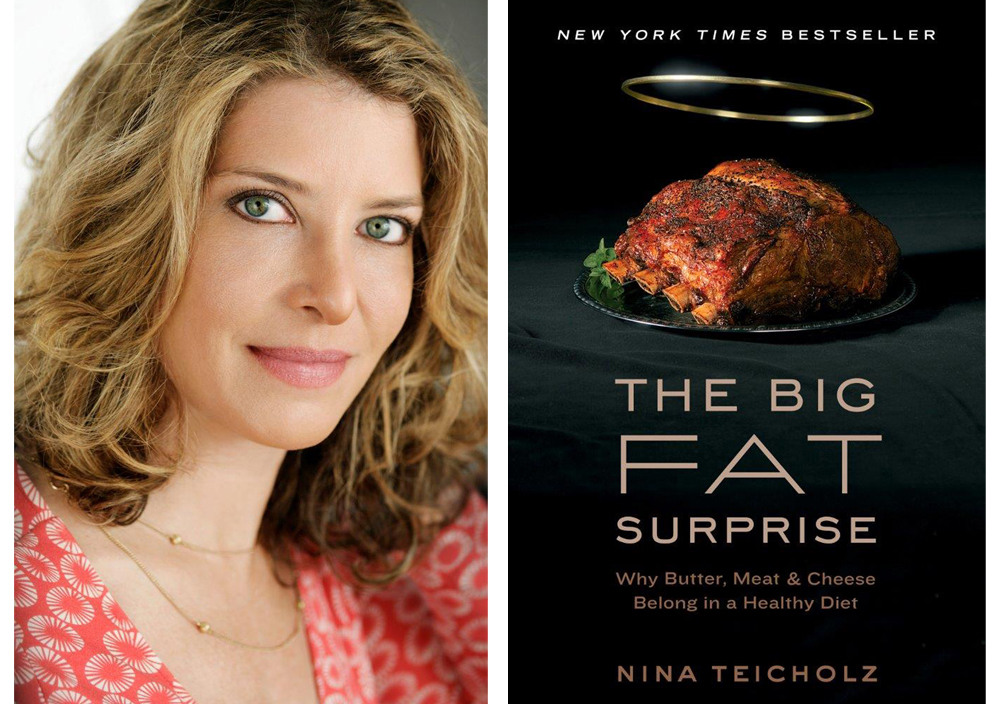
Nina Teicholz is an influential journalist who sent shockwaves through the American diet establishment with her 2014 bestseller The Big Fat Surprise: Why Butter, Meat & Cheese Belong in a Healthy Diet.
The book was named a “best book” of the year by The Wall Street Journal, The Economist, Fortune Magazine, Mother Jones, Library Journal, and Kirkus Reviews.
This extremely well-researched exposed the corrupt war on animal fats that has been raging since the 1960s.
If you’re familiar with Nina’s book or just discovering her work and personal story, you’re probably wondering what the Nina Teicholz diet actually consists of.
In this article, we’ll explore the origins of Nina’s illuminating views on diet, the foods that she herself eats, and offer a robust food list to keep you focused on healthy high-fat whole foods.
Table of Contents
What Does Nina Teicholz Eat?
Based on Nina’s writing on the health benefits of a high-fat low-carb diet, you may be wondering if there is an official Nina Teicholz diet.
The short answer is, no.
However, Nina is a strong supporter of a high-fat, low-carb lifestyle. She routinely cites studies showing that high fat diets are healthy, safe, and effective for combating metabolic disease, type-2 diabetes, and heart disease.
Since 2004 Nina herself has reported eating a low-carb, high-fat diet centered around juicy steaks, rich cheese, and copious quantities of butter. 3
If we are to extrapolate from Nina’s reports of her own meals, we can say that she consumes mostly high-fat carnivore diet foods. Though admittedly, the details are lacking.
On Nina’s website, she has a section titled, “How can I eat a healthy, higher-fat diet?” But it is followed by “Check back, we’re developing this section as a resource for you.”
In this article, we’ll step in and attempt to fill the void with a Tiecholz-inspired high-fat, low-carb food list.
Origins of Nina Tiecholz’s View on Fat
Nina Teicholz was first cued to the idea that we have fat backward around 2003. At that time, she was working as a freelance food journalist writing for Gourmet in New York City.
Up until then, Teicholz had been eating what she had thought was a “healthy” nearly vegetarian diet of fruits, vegetables, and whole grains. She was also exercising almost every day. Yet she didn’t feel particularly healthy and was carrying around an extra 10 lbs that she couldn’t shed.
Then came the restaurant review gig that had her suddenly devouring classic high-fat meals loaded with marbled meats, creamy sauces, rich pate, and luscious cheeses.
To Teicholz’s surprise, she didn’t just not gain weight, but she lost those stubborn 10 lbs that no amount of exercising and plant-based eating had done anything about. She also felt satiated and satisfied like never before.
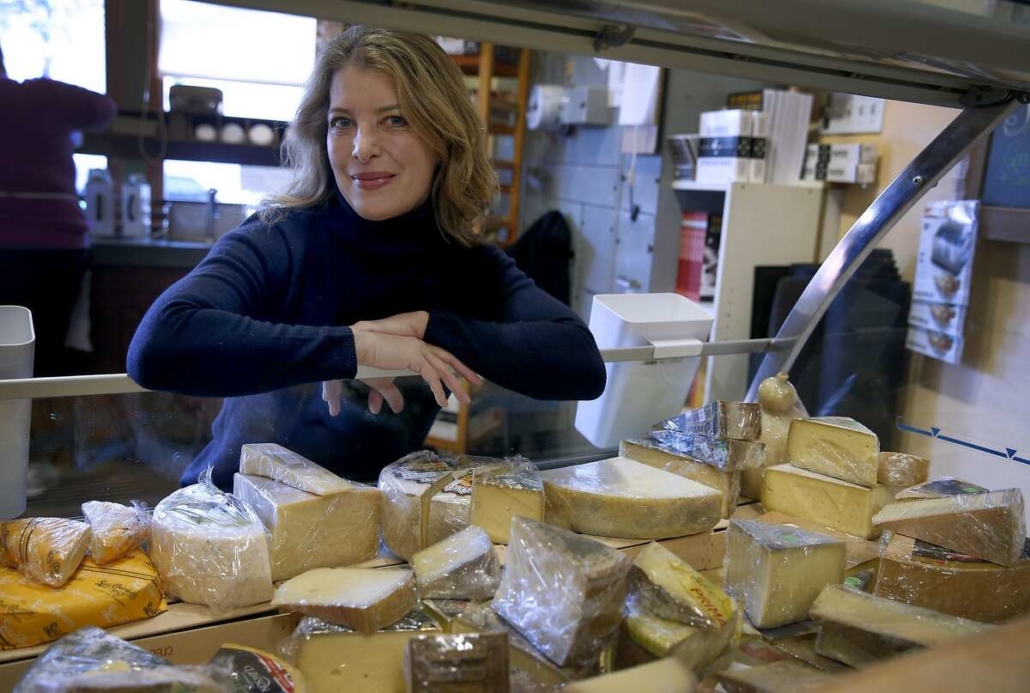
Coinciding with her restaurant reviews was an assignment to research the corrupt influence that the vegetable industry has had on mainstream recommendations against animal fats and the resulting health epidemics of obesity, heart disease, diabetes, and cancer.
That original article assignment sent Tiecholz on a 10-year research project to expose the false “diet-heart hypothesis” as a product of manipulated science promoted by the powerful vegetable oil industry in cahoots with the American Heart Association.
Among her many revelations was how Proctor & Gamble, the company behind Crisco, helped funnel millions of dollars to the American Heart Association, transforming it from a tiny volunteer organization to a powerful lobby with national influence.
Now Teicholz occupies nearly all of her time leading the Nutrition Coalition, a non-profit organization she founded to promote high evidence-based standards for national nutritional recommendations.
Teicholz’s Conclusions
Nina’s research has revealed that the pillars of the diet-heart hypothesis must be rigorously questioned in light of more rigorous, higher-quality scientific evidence.
These outdated pillars include the notions that consuming animal fat and cholesterol lead to heart disease.
Below you can watch Teicholz explain why beef, butter, and cheese should be considered the cornerstones of a healthy diet.
Cut Carbs, Not Cholesterol
Studies show that there is, in fact, no evidence linking the cholesterol we eat to elevated blood cholesterol levels.4
As a result, the 2015–2020 Dietary Guidelines for Americans got rid of the decades-old recommendations for restricting dietary cholesterol to 300 mg/day. To be clear, there is no upper limit on dietary cholesterol intake.
Furthermore, numerous modern studies link high blood cholesterol with lower all-cause mortality risks. While low cholesterol levels have been shown to increase many health risks, including all-cause mortality. [14] [15] [16] [17] [18] [19] [20] [21] [22] [23] [24] [25] [26]
Conversely, getting more than 60% of your calories from carbs lowers your “good” HDL cholesterol while raising triglycerides–both of which can have negative consequences on your heart health. [33]
Saturated Fat From Whole Animal Foods is Healthy
Butter, meat, and eggs have also been demonized for their saturated fat content. However, modern studies tell us that blaming these foods for heart disease is misguided and not supported by science.
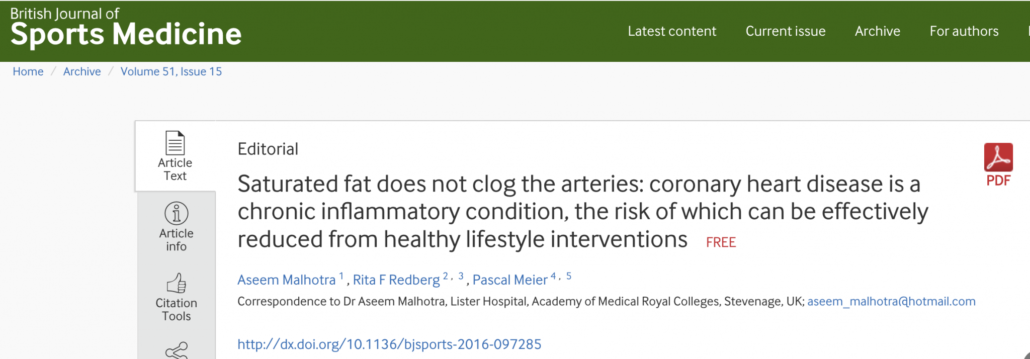
For example, this 2017 study published in the British Journal of Sports Medicine states that[1]
- Coronary artery disease pathogenesis and treatment urgently requires a paradigm shift. Despite popular belief among doctors and the public, the conceptual model of dietary saturated fat clogging a pipe is just plain wrong.
- A landmark systematic review and meta-analysis of observational studies showed no association between saturated fat consumption and (1) all-cause mortality, (2) coronary heart disease (CHD), (3) CHD mortality, (4) ischaemic stroke or (5) type 2 diabetes in healthy adults. [2]
- Similarly, in the secondary prevention of CHD there is no benefit from reduced fat, including saturated fat, on myocardial infarction, cardiovascular or all-cause mortality.2
- In an angiographic study of postmenopausal women with CHD, greater intake of saturated fat was associated with less progression of atherosclerosis, whereas carbohydrate and polyunsaturated fat intake were associated with greater progression. [3]
Similarly, this study from 2020 concluded that eating unprocessed red meat is not associated with heart disease, “indicating that saturated fat content of meat is unlikely to be responsible for this association.” [6]
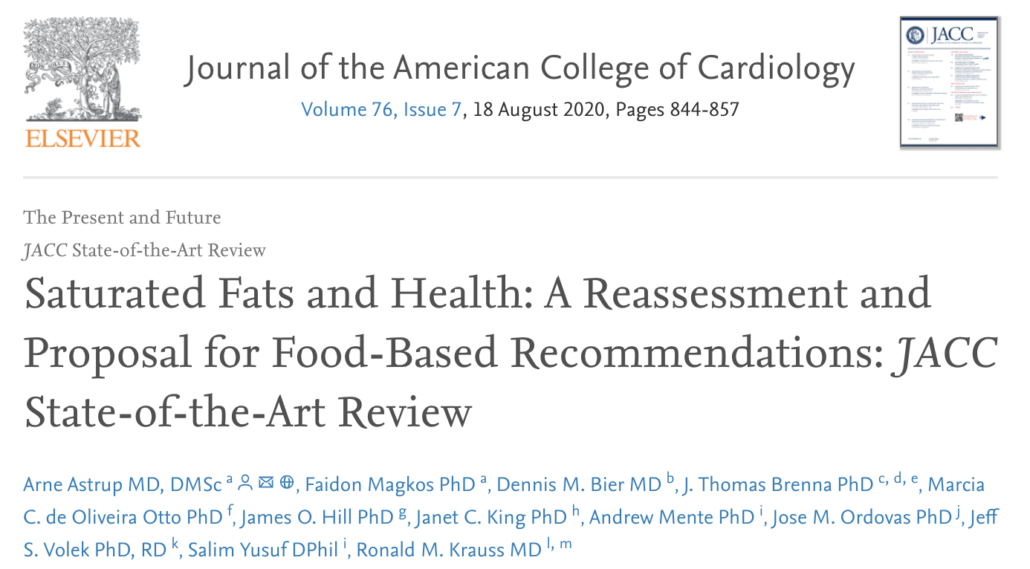
The study states that “Whole-fat dairy, unprocessed meat, and dark chocolate are SFA-rich foods with a complex matrix (of nutrients) that are not associated with an increased risk of CVD. The totality of available evidence does not support further limiting the intake of such foods.”
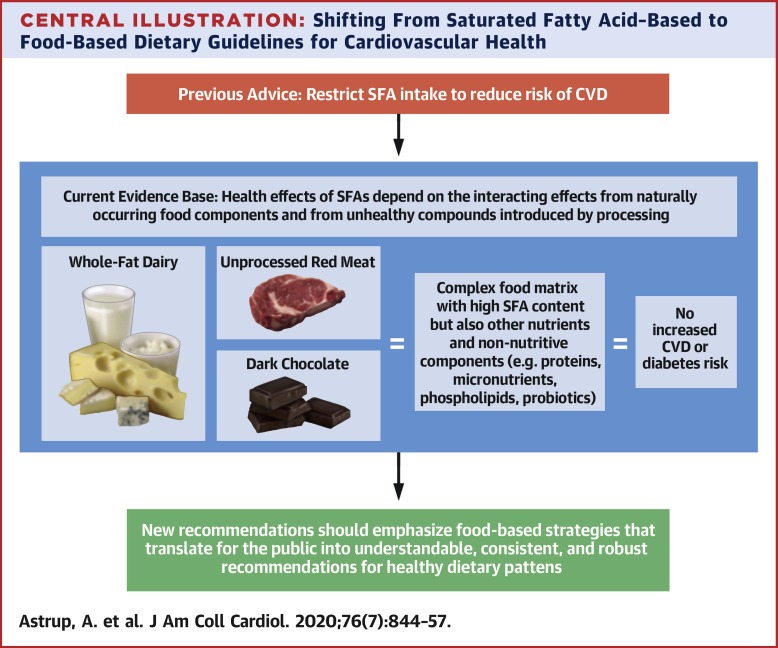
Vegetable Oils are Toxic Industrial substances
Teicholz is a champion of high-fat, low-carb eating, but she strongly cautions against getting your fat from vegetable “seed” oils.
Teicholz points out how vegetable oils undergo a complex industrial process before they make it to your plate. This multi-step process includes
- high-pressure extraction using hexane as a solvent
- steam cleaning
- nickel catalyst treatment
- mixing with soap-like emulsifiers
- Degumming and “deoderization” to remove bad odors
- bleaching to remove the grey color
From Tiecholz’s research, if fats are implicated in heart disease, it is likely from polyunsaturated industrial vegetable oils.
For example, researchers of this 2018 study concluded, “In summary, numerous lines of evidence show that the omega-6 polyunsaturated fat linoleic acid promotes oxidative stress, oxidized LDL, chronic low-grade inflammation and atherosclerosis, and is likely a major dietary culprit for causing CHD [congenital heart disease], especially when consumed in the form of industrial seed oils commonly referred to as ‘vegetable oils.” [16]
In fact, vegetable oils are the third most deadly lifestyle risk factor, behind only severe obesity and heavy smoking. And since we know that vegetable oils drive obesity, it is likely that vegetable oil is actually the number one lifestyle factor that increases the risk of death.
Foods to Eat On a Nina Tiecholz Diet
To boost your fat content and eliminate vegetable oils, Nina recommends whole-food animal products, including beef, butter, tallow, and cheese.
Let’s take a closer look at each of these Nina Tiecholz diet foods.
Butter
Butter, especially from grass-fed cows provides numerous nutrients, including conjugated linoleic acid (CLA), butyrate, fat-soluble vitamins, and minerals.
Studies show that consuming butter can reduce the risk of diabetes, obesity, and heart disease.2
Butter is also linked to improved immune function, sleep 3, and fertility. [7]
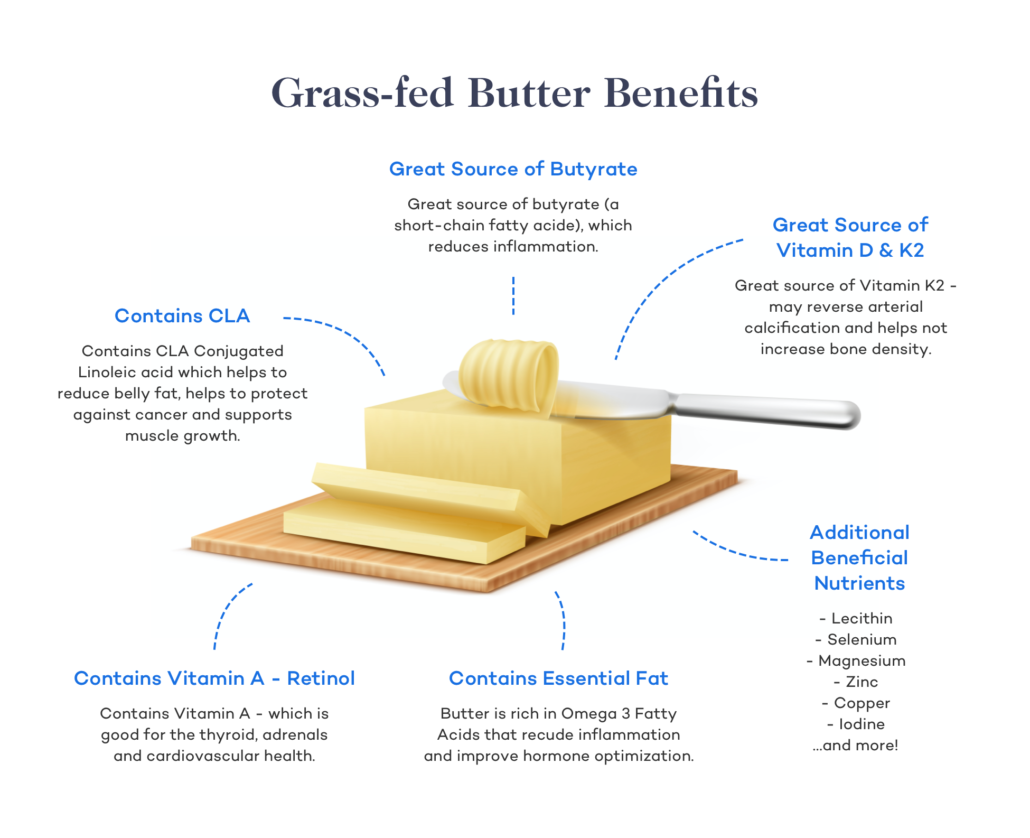
Tallow
Tallow rendered from beef and other animals like duck and bison provide long-chain saturated fats that support healthy cell membranes and play a role as signaling molecules. [2]
Studies show that consuming more saturated fat can protect your cells from glycation, oxidation, endotoxin buildup, and other cellular stressors. [3] [4] [5]
Fatty Cheese
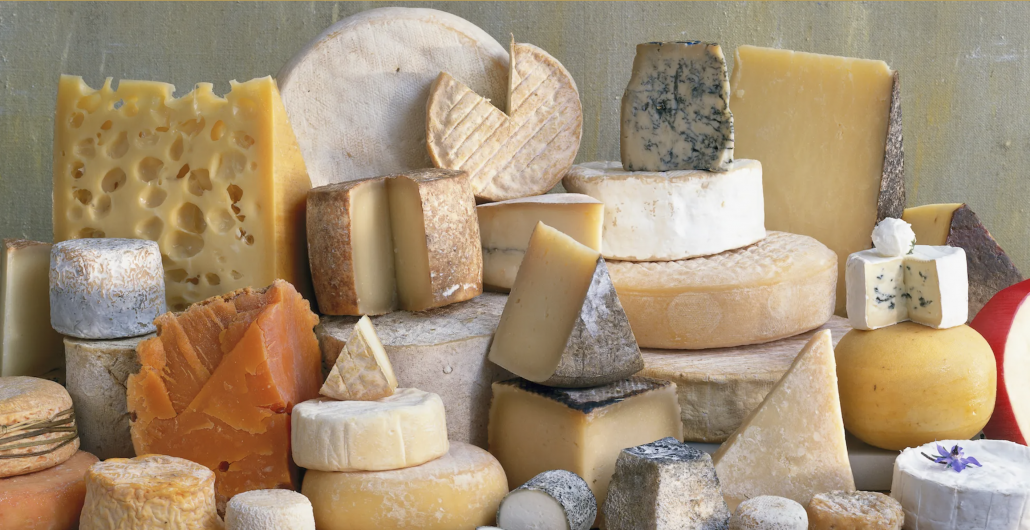
Fatty cheese, especially aged cultured varieties like blue cheese, offers a variety of nutritious compounds with anti-inflammatory and anti-aging properties. [2] [3][4] [5]
For example, the compound known as spermidine has been shown to promote cellular fitness and have an anti-aging effect on multiple organs, including the heart, while supporting anti-cancer immune responses and protecting against neurodegenerative disorders. [12]
Contrary to the diet-heart hypothesis, studies show that consuming full-fat dairy is associated with a decreased risk of obesity, type 2 diabetes, and heart disease. [9] [10] [11] [12]
A large-scale review that looked at data from more than 3.6 million participants found that high-fat dairy products are not associated with any causes of mortality. [13]
Beef
In addition to the healthy fats detailed above, Tiecholz is an outspoken proponent of red meat, and especially beef.
Beef provides numerous essential macro and micronutrients in the most bioavailable formats, and in near-perfect proportions for your body’s needs.
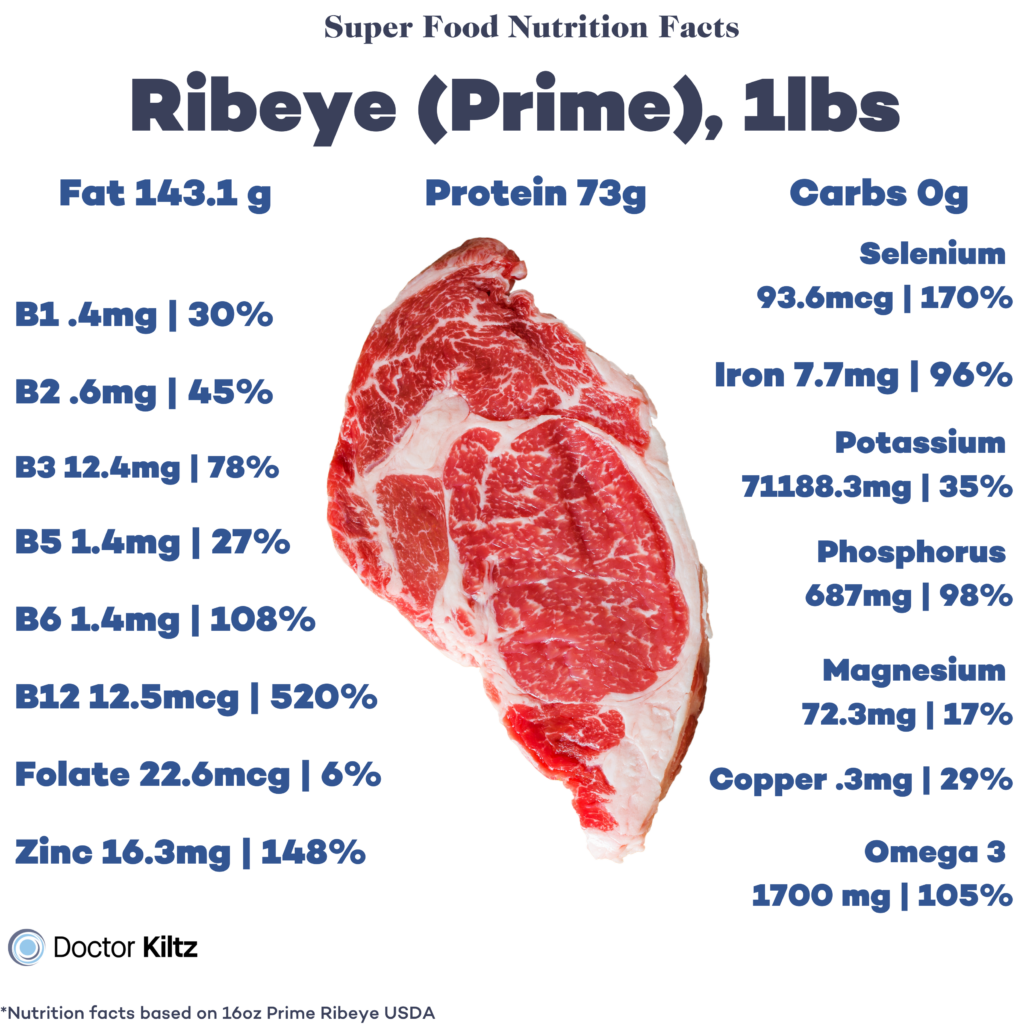
In addition to complete proteins, anti-inflammatory monounsaturated fats, CLA, red meat also has numerous powerful meat-specific compounds.
- Carnitine: powerfully improves sperm count and motility. [6]] Supports mitochondrial function and insulin sensitivity for people with type 2 diabetes. [8] Reduces inflammation and supports heart health [30] [31] Protects against neurodegenerative diseases and supports brain function.[24] [25] [26]
- Carnosine: Protects heart and muscles[2][3]. Prevents glycation–the destructive bonding of glucose to your cells and DNA. [4] Eliminates free radicals and reduces damage and shortening of telomeres associated with aging. 5]
- Creatine: Supports cognitive function. [10] Boosts athletic performance. [11] Alzheimer’s patients show low creatine levels. [12] Improves cardiovascular performance and supports glycemic control. [13]
- Taurine: Reduces glycation, inflammation, and oxidative stress. Antioxidant and anti-depressive effects.
- Zinc: protects against coronary artery disease. Essential to the expression of over 300 enzymes. [18] [19] Zinc in beef is 400% more bioavailable than the zinc you get in breakfast cereals. [15] Reduces risk of erectile dysfunction and infertility in men. [14]
- Vitamin B12: Shown to significantly reduce depressive symptoms. [14] Found only in animal products. Deficiency in B12 can lead to dementia and Alzheimer’s disease. [21]
- Heme Iron: Only found in red meat. Plays an essential role in supporting immune function, cognition, and energy metabolism. [15]
The Nina Tiecholz Diet: The Bottom Line
Nina Tiecholz is an influential journalist. She spent over ten years researching the corrupt influences that industrial vegetable oil companies have had on national guidelines for reducing the consumption of foods high in saturated animal fats, including meat, cheese, and butter.
Contrary to these faulty recommendations, Nina Tiecholz recommends a high-fat, low-carb, animal-based diet as the most effective approach to combating obesity, heart disease, and diabetes, among other modern maladies.
Though Tiecholz doesn’t promote a single diet, she herself has reported consuming large quantities of steak, butter, and rich cheeses.




















